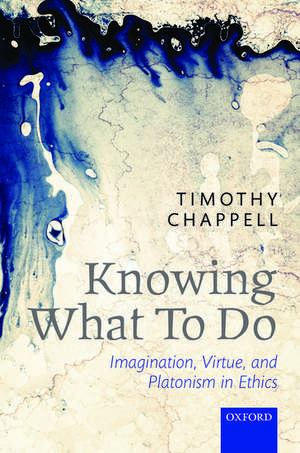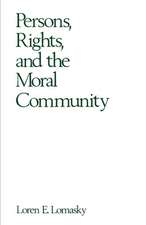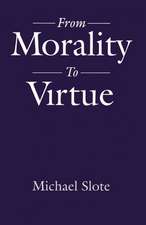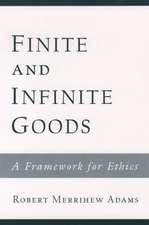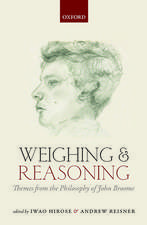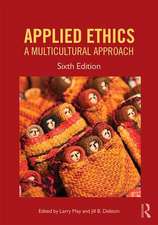Knowing What To Do: Imagination, Virtue, and Platonism in Ethics
Autor Sophie Grace Chappellen Limba Engleză Hardback – 27 mar 2014
| Toate formatele și edițiile | Preț | Express |
|---|---|---|
| Paperback (1) | 245.55 lei 31-38 zile | |
| OUP OXFORD – 30 mar 2017 | 245.55 lei 31-38 zile | |
| Hardback (1) | 531.00 lei 31-38 zile | |
| OUP OXFORD – 27 mar 2014 | 531.00 lei 31-38 zile |
Preț: 531.00 lei
Preț vechi: 673.64 lei
-21% Nou
Puncte Express: 797
Preț estimativ în valută:
101.62€ • 105.29$ • 84.81£
101.62€ • 105.29$ • 84.81£
Carte tipărită la comandă
Livrare economică 10-17 martie
Preluare comenzi: 021 569.72.76
Specificații
ISBN-13: 9780199684854
ISBN-10: 0199684855
Pagini: 350
Dimensiuni: 162 x 240 x 28 mm
Greutate: 0.67 kg
Editura: OUP OXFORD
Colecția OUP Oxford
Locul publicării:Oxford, United Kingdom
ISBN-10: 0199684855
Pagini: 350
Dimensiuni: 162 x 240 x 28 mm
Greutate: 0.67 kg
Editura: OUP OXFORD
Colecția OUP Oxford
Locul publicării:Oxford, United Kingdom
Recenzii
The book must be praised as an inspiring expression of an ethical vision with deep historical roots and urgent contemporary relevance ... Sophie Grace Chappell's book is itself an ethical exemplar, a study in the contemplation of value, a testament to ordinary goodness. Event hose who disagree must contemplate his arguments; since "if we can't see individual specific things, we can't see anything at all"
Knowing What to Do is an excellent book: the clear prose and application of literature, philosophy, and history make it an enjoyable read. This book appeals to nonspecialists and specialists alike. The focus of this book is mostly on metaethics and normative ethics, but it also concerns areas in applied ethics, such as environmental ethics and biomedical ethics, as well as epistemology. Additionally, anyone interested in issues concerning philosophical methodology will find this book useful.
A book that frequently challenges the conventional expectations of a philosophy research monograph ... his non-conventional approach not only serves to illuminate important aspects of moral thought that normally receive little or no attention in systematic moral theory, but also helps to support the claim that these are aspects of moral thought that moral philosophers may want to say more about
[M]akes available in the context of contemporary debates a version of ethics which could deliver the discipline from the tyranny of theory... Imagination plays a large role in Chappell's own presentation, and this is one of the many delights for the reader.... If knowing what to do, knowing what is required to live well, is a real concern of yours, then this book is a valuable asset for your search. It should lead to a revision of the teaching of ethics in higher education.
Knowing What to Do is an excellent book: the clear prose and application of literature, philosophy, and history make it an enjoyable read. This book appeals to nonspecialists and specialists alike. The focus of this book is mostly on metaethics and normative ethics, but it also concerns areas in applied ethics, such as environmental ethics and biomedical ethics, as well as epistemology. Additionally, anyone interested in issues concerning philosophical methodology will find this book useful.
A book that frequently challenges the conventional expectations of a philosophy research monograph ... his non-conventional approach not only serves to illuminate important aspects of moral thought that normally receive little or no attention in systematic moral theory, but also helps to support the claim that these are aspects of moral thought that moral philosophers may want to say more about
[M]akes available in the context of contemporary debates a version of ethics which could deliver the discipline from the tyranny of theory... Imagination plays a large role in Chappell's own presentation, and this is one of the many delights for the reader.... If knowing what to do, knowing what is required to live well, is a real concern of yours, then this book is a valuable asset for your search. It should lead to a revision of the teaching of ethics in higher education.
Notă biografică
Sophie Grace Chappell is the author of numerous books and articles on ethics, ancient philosophy, epistemology, and philosophy of religion. He has taught at universities including the University of Oxford, the University of British Columbia, the University of East Anglia, and the University of Manchester. Since 2006 he has been Professor of Philosophy at The Open University.
